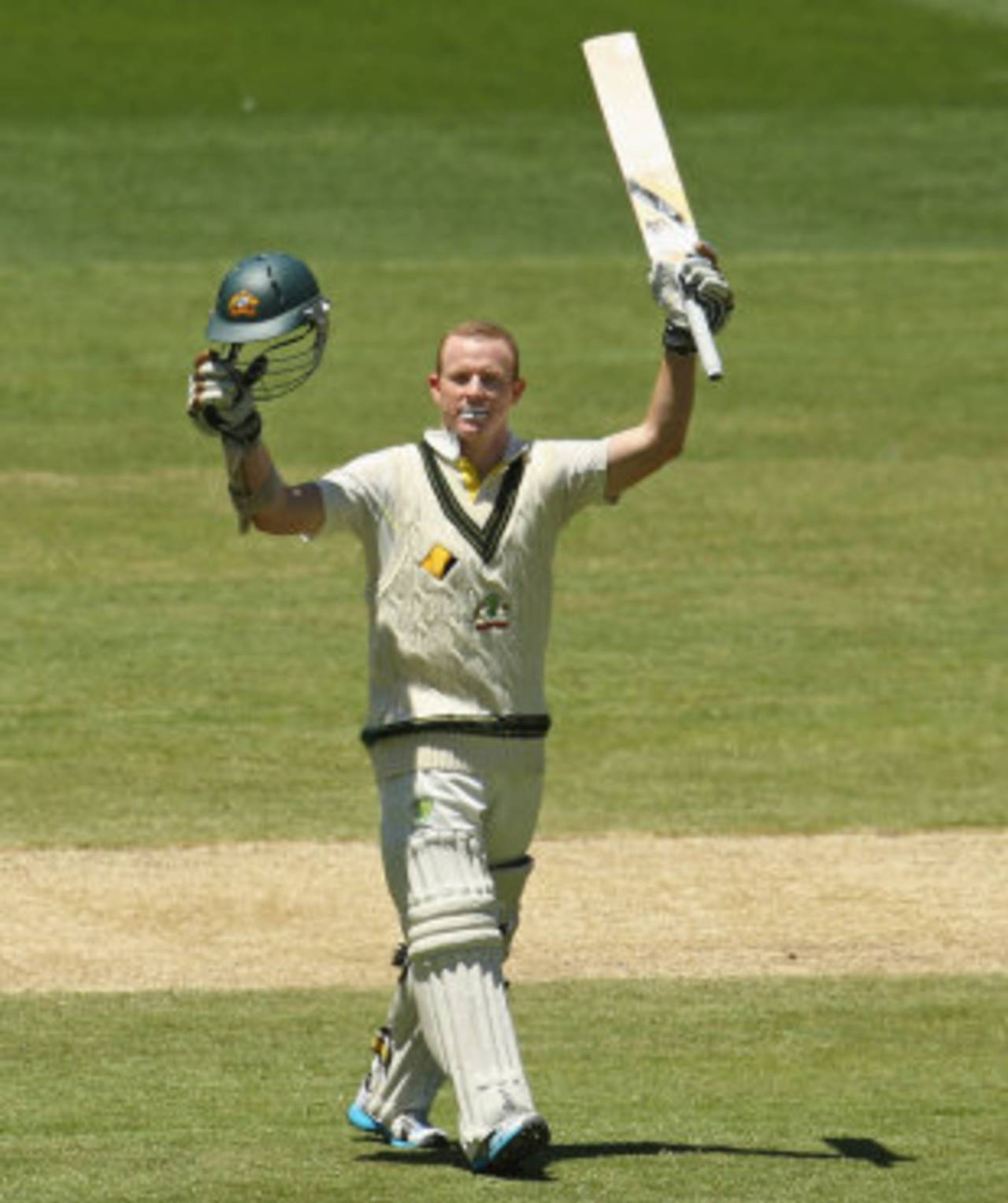Workaday Rogers sets battling example
Australia's batting coach Michael Di Venuto wants his charges to adopt the persistent attitude shown by Chris Rogers in the Ashes to find the consistency of the great batsmen
Daniel Brettig
Dec 30, 2013, 7:02 AM

The MCG ton came on the back of hard graft and an aptitude to fight • Getty Images
A rapid, even impish century to deliver the Boxing Day Test for Australia brought much glory to Chris Rogers. What the national team's batting coach, Michael Di Venuto, wants the rest of his pupils to learn from is how Rogers fought and scraped through the rest of the series to get there. "You don't have to be in good form to score runs," Di Venuto said. "That's just a myth."
The Australian batsmen have looked somewhat vulnerable throughout the Ashes, despite their 4-0 margin over England. Di Venuto is seeking to instil the idea that scoring runs when feeling good about doing so is only a small part of the job. Far more important is the ability to do it when the bat feels more toothpick than sabre, the ball more squash than beach-sized. To borrow from golf, batting can be a game judged less by the quality of your best days than by that of your worst.
"Sometimes you go out and the ball hits the middle of the bat and you are away. Other times it doesn't happen," Di Venuto said the morning after Australia's eight-wicket win at the MCG. "What Chris does, and what he has done his whole career, is that no matter what sort of form he is in he scores runs. That is the name of the game.
"There is no point scoring runs only when you are in top form and nothing when you're not hitting them that well. He finds a way to score runs. He is a run scorer. When he is in top form like he was yesterday he hit a beautiful century. The best players average 50 and 60 because when they're not in top form, they still get a score.
"They might battle around and scratch around but they still contribute to the team and get into a partnership and then when they have their days they go on and get a big hundred. You don't have to be in great form to score runs but the longer you stay out there you might actually start running into a bit of form."
Staying out there is what Rogers has had to subsist on for most of the summer, scrounging out handy runs here and there when others might have thrown it in with an early waft. Some of this is to do with his lifelong calling as a workaday professional, adept at putting in a solid shift whether it be at Melbourne in December or Northampton in May.
It is not always easy. When Rogers concluded his first Ashes series in England earlier this summer, he played again for Middlesex within a few days of the fifth Test concluding. Fatigued by the mental strain of it all and heavy on his feet, he failed twice in a heavy defeat. So began a sequence in which Rogers struggled mightily for "form", the often elusive marriage of technique and temperament.
With Victoria at home, Rogers found it very difficult initially to find his batting rhythm. He dug in at the crease but without any real flow, eventually cajoling himself into some sort of touch with 88 and 117 against New South Wales in the Sheffield Shield. But he was out twice cheaply in the final match before the Gabba Test, and fell rapidly again on the first morning of the series.
At this point, there may have been the first murmurings about his place emerging in the more hyperactive corners of the media. On the second day of the Gabba Test, Rogers walked out with David Warner after Mitchell Johnson had torn a gaping hole in England's batting. Early wickets were imperative for the tourists, who were not yet the listless lot that trudged around the MCG. Barely middling a ball, Rogers hung around for 94 key minutes to add 67 with a far more fluent Warner.
There was a first innings contribution in Adelaide, despite fluency remaining elusive. A batting session with Justin Langer in Perth provided some impetus to move forward, then a hare-brained run out in Perth while looking strong stalled Rogers' progress. Nonetheless, he persevered, with scores of 54, 61 and 116 reflecting the sort of upward curve any batsman would cherish.
For Di Venuto, Rogers' series is a pointer to the likes of Warner, Shane Watson, Michael Clarke and George Bailey that there is more than one way to make runs. A strong Australian first innings at the SCG, or in South Africa beyond, cannot come to pass without a few ugly 50s and 60s to go alongside the bristling century of the man who finds form on the day.
"Our first innings definitely needs to improve and that's something we've talked about regularly," Di Venuto said. "All the batters are in form, all the batters are scoring runs, it's just a matter of putting it together in that first innings, which is so important in the game. It sets the match up.
"So we've been lucky this series where Brad Haddin's been outstanding and come to the rescue of the top order in every first innings so far, but we don't want to get into a situation where we're relying on Brad Haddin to drag us out of trouble every time. Hopefully it's a matter of guys going out there, building partnerships and getting runs on the board."
Whether he is in decent touch or well out of it, Rogers can be expected to contribute.
Daniel Brettig is an assistant editor at ESPNcricinfo. He tweets here